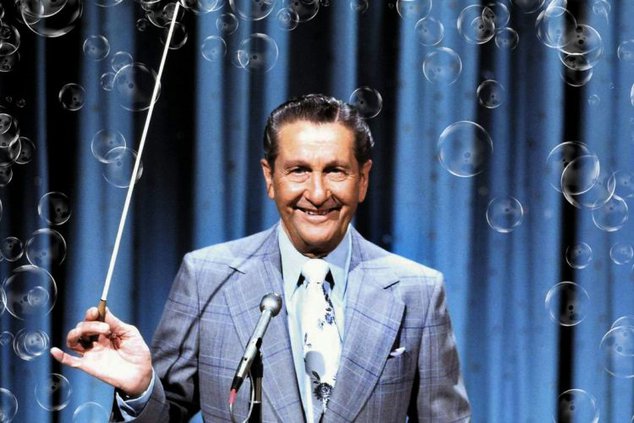
Wunnerful a Wunnerful
Lawrence Welk was quite popular with the viewing public during his show’s original run and continues to have a nostalgic fan base even today.
The Lawrence Welk show was a smash hit for the older demographic of Americans who tuned in each week to hear Welk’s big band in the 50s and 60s on the new home appliance called a television. It was a splashy LA production featuring easy-listening music of polkas and tunes suited for his dancers to glide around in front of the band, wearing sailor suits or the like, smiling and whipping their heads around to face the live studio audience as they twirled in wholesome, simple, family-appropriate charm, dazzling with tunes made famous by the Glenn Miller Band, tunes like In the Mood.
Welk was born in the rural community of Strasburg, North Dakota, to German-speaking immigrants from Ukraine. By itself, his thick accent made his show a novelty, and his trademark phrase he crowed after each song—“Wunnerful, wunnerful”—matched his cheery, polite demeanor. I tell you this as an introduction to my grandfather, Julius Skordahl, a Norwegian immigrant to the state neighboring Welk’s, South Dakota. His native brogue remains a fond recollection for me. I lived in Sioux City, Iowa. He did not. I spent time with him only four times, over the ages of 8-13 years, in towns like Boise, Idaho, Walla Walla, and Mt. Vernon, Washington, not far from the Canadian border. Some of our trips were during Christmas when grandfather annoyed his three daughters by crouching next to the brightly-lit tree and shaking his presents, declaring they were shirts, handkerchiefs, and such. He looked up at us with a devilish smile, his blue eyes shimmering, and his face wrinkled with glee.
Educated as a large-animal veterinarian in a Kansas City college, I have several of his textbooks with his signature on the first page and a few photos secreted among its pages. One shows him playing basketball with a huge stogie clenched between his teeth, his devilish smile sneaking through. No one would say that Grandfather abruptly closed his vet practice and took a job as a federal meat inspector in Boise for a reason. Grandfather and his Swedish immigrant wife, Melvie Matson, left for the grandeur of Idaho.
On a trip to Boise when I may have been ten or so, he took me on a day trip to visit several mom-and-pop meat processing plants in the Rockies, a short drive away, where everyone called him Doc as he glided through the door to their facilities. Many called him Doc, his daughters, their husbands, the guy at the gas station, and the waitress in the café on that day we traveled together. The café, crouched beneath towering pines, was rustic. The waitress, who appeared to be a relative of Paul Bunyan, approached the table, tapped her pencil on her order pad, waiting for our sandwich orders. Grandfather said, “Stevie, you can have anything you want as long as it does not cost more than a quarter.” And he gave me his devilish smile, his face creased from the pleasure.
As an early teen, we made the train trip across the country to Mt. Vernon to see Grandfather. Grandmother, whom I met only twice, had died, and he was living alone in a modest house with his old truck parked in the side yard. My lodging was its camper, replete with a wood-burning pot belly stove with a smokestack sticking into the air. He took it on fishing trips along the Skagit River, reeling in steelhead fish and swapping insults with other Copenhagen snuff aficionados.
My mother and family members went into town on a gray winter morning. I chose to sit with Grandfather and watch TV. “Stevie,” he said, “get me another little hooker.” He grinned; his eyes sparkled with glee. This routine occurred three or four times during the morning. I brought Grandfather a coffee cup, half full: a little hooker. Grandfather reached for the floor near his easy chair and groaned slightly from the effort. He looked up at me. I smiled back at him as he lifted a pint of bourbon and added a couple of ounces of the liquor to his little hooker.
There was a knock at the door; Grandfather popped up and showed his trademark smirk. He opened the door, and a seventy-something tall man dressed in a wool, plaid shirt entered. I don’t recall his name, so I’ll call him Walt.
Walt did not enter the room fully until Grandfather closed the picture window drapes that looked at Walt’s house. Satisfied the view was blocked, Walt sat in an over-stuffed chair exactly as the Lawrence Welk Show began. Even as young as I was, I thought this strange.
The show started. Walt did not move. His eyes stared at the screen. He did not say a word. Gratefully, Welk said “Wunnerful, Wunnerful” for the last time and Grandfather got up, turned off the set. Walt got up, said, “Thanks, Julius,” and left. Grandfather opened the drapes and stood before me. “Walt and his wife are Mormons or something, and they are not supposed to watch television. He comes over every Wednesday at 2 to see The Lawrence Welk Show. His wife thinks he comes over to buddy up with me.” Again, the smile, the eyes, the facial creases.
All Rights Reserved. © Steve Gerkin | No reprints without permission.

